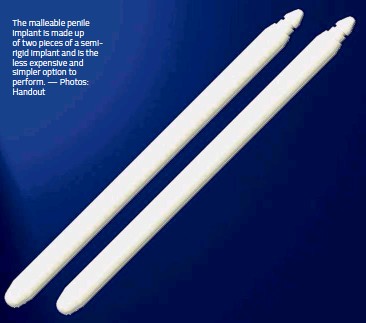When other treatments for erectile dysfunction fail, penile implants may become the last option.

ERECTILE dysfunction (ED), also known as impotence, is a male health problem that can greatly impact a man’s self-esteem.
A person who suffers from ED is unable to get or maintain an erection firm enough to have sexual intercourse, which may put a strain on physical relationships and generate self-doubt and a sense of emasculation.
Depending on a person’s condition, there are various ways to tackle this issue, including psychological counselling, medications and surgery.
There is a common locker room misconception that penile implants, which involve surgery, are only designed to give extra length and size.
While they are not size boosters, they constitute one of the most effective approaches in overcoming ED and can serve to restore self-esteem and confidence in patients.
Penile implants are reserved as a last resort for patients suffering from ED but they can also be offered to patients with severe penile curvature with erection issues.
Before implants are considered as a solution, patients are usually offered a variety of other treatments depending on the degree of their ED.
Patients with milder symptoms can be offered medication, but if he is unable to tolerate the side effects of the medication or is deemed unsuitable to take them, a penile pump, medicated injection or an implant will be advocated as an alternative.
Patients who have had prostate cancer surgery are also at risk of ED as the surgery to remove the tumour-laden prostate might involve removing nerves contributing to erection and urinary continence.
Even a surgery meant to treat benign prostate enlargement runs a small risk of resulting in ED, which is why it is of vital importance for patients to understand risks before consenting to surgery.
ED can also be found in patients suffering from various medical conditions such as diabetes hypertension, high cholesterol levels, heart issues, kidney failure, spinal cord injuries etc.
Men who suffer from stress, anxiety or other psychological issues might also find themselves unable to attain erections.
Types of implants
There are two types of penile implants: malleable (two-piece) and inflatable (three-piece) penile implants. Both are concealed in the body.
The malleable type is made up of two pieces of a semi-rigid implant and is the less expensive and simpler option to perform.
The surgery involves implanting both the implants in the shaft of the penis, which can be bent upwards, simulating an erection. The malleable implant may have some side effects such as giving the penis an unnatural partial erectile appearance and occasionally cause thinning or erosion of the penile tissue, as the semi-rigid nature of the implant exerts some degree of pressure on the flesh.
The inflatable penile implant is a soft saline-fluid-filled device. It comprises of two thin penile tubes (where the saline enters), a pump and a reservoir.
Whenever the patient wants to attain an erection, he can press the pump which is placed in the scrotum beside the testicles. The fluid from the reservoir, placed inside the abdomen, will then be channelled to the thin tubes implanted in the penile shaft, creating an erection.
While comparatively more expensive, the inflatable penile implant gives a better aesthetic appearance and has fewer side effects compared to the malleable type.
Both types of implants do not alter the sensation of the penis or reduce the orgasm. An optimal size will be implanted in order to not cause pain to the patient or overstretch the penile shaft.
What to know before you consider implants
It is important to first gauge the expectations and understand the risk and complications of a penile implant before surgery is done.
There are several factors which might affect the success of the operation – the size of the penis and scrotum, the degree of penile curvature, previous radiotherapy/ penile surgeries, the patient’s premorbid status and his commitment to hygiene.
While the incident rate is quite low, it is crucial to bear in mind that the penile implant is still a foreign gadget in the human body, despite being bio-compatible and may run a risk of infection, bleeding, pain and mechanical malfunction.
Many ED patients have plenty of productive years ahead of them and penile implants can offer them a life-changing solution. ED patients who have not experienced success with medications should consider penile implants as they might restore quality of life and give the patients a boost of confidence.
Dr Warren Lo is a Consultant Urologist. The information provided is for educational and communication purposes only and it should not be construed as personal medical advice. Information published in this article is not intended to replace, supplant or augment a consultation with a health professional regarding the reader’s own medical care. The Star disclaims all responsibility for any losses, damage to property or personal injury suffered directly or indirectly from reliance on such information.



